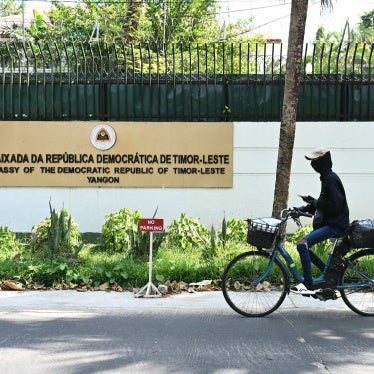The visit by Burma’s foreign minister to Japan this week, the first by such a senior official in 16 years, is an opportunity for Tokyo to put the long and vexed relationship between the two countries on the right track. Bureaucrats and corporations will be urging the Japanese government to increase overseas development assistance and investments in Burma’s emerging markets, especially the lucrative natural resources sector. Their argument will be that aid and trade coupled with quiet diplomacy is the best approach to encouraging reform in long isolated, repressive Burma.
This is not the approach Japan should take. It has been Tokyo’s policy toward Burma for decades, and it has not worked. Burma’s government is engaging in a sophisticated campaign to convince the world that is in transition from a military regime to a more open society. Japan should try to capitalize on its recent promises by pressing for genuine human rights reforms.
Burma’s government, formed on March 30 and consisting mainly of former military officials, has promised economic, political and legislative reforms. It has softened its rhetoric by using language on human rights and democracy, met with the democracy leader Aung San Suu Kyi, and loosened some restrictions on the media. President Thein Sein, a former general, has called on exiled dissidents to return. Crucial by-elections are slated for the end of 2011. There has been increased pressure on the government to allow the opposition National League for Democracy (NLD) to register and possibly to offer candidates in the elections, though no decision has been made.
The suspension of a massive Chinese-financed hydro-electric dam in Kachin State on September 30 was another surprise gesture. However, the controversy around the dam should send important warning signs to Japan that investment in natural resource extraction in Burma without significant human rights reforms could fuel abuses, destabilize the environment, and facilitate corruption.
Last week, the Burmese government released 220 of its approximately 2,000 political prisoners in a total amnesty of more than 6,000 prisoners in a humanitarian gesture. This continues the trend over the past decade in Burma in which much heralded amnesties free only a fraction of dissidents. Burma’s favorite comedian, Zargana, expressed his disappointment with the amnesty, saying on his release: “The government does not have a true desire to release all political prisoners…Is there any cost to them in releasing the political prisoners?” Aung San Suu Kyi, who has cautiously welcomed some of the government’s actions, said the amnesty was insufficient.
Japan’s stated Burma policy is to encourage “solid democratization and national reconciliation,”
but this is a chimera when the military continues to conduct attacks on civilians in ethnic minority areas. Attacks by the Burmese army against civilians in conflict zones have intensified in 2011, with continued abuses in Karen State in eastern Burma, plus renewed fighting in the northern Kachin and Shan States, in which longstanding ceasefires recently broke down. An estimated 50,000 civilians have been displaced in this fighting.
Human Rights Watch has documented serious abuses by the Burmese army, including extrajudicial killings, attacks on civilians, unlawful use of forced labor, and pillaging of villages. Japan has so far demurred from supporting growing calls for a United Nations-led Commission of Inquiry into serious violations of international humanitarian and human rights law.
Japanese officials have heralded positive gestures in Burma as a new page in their bilateral relationship, but Japan needs to do more to make these actions meaningful. For starters, the Japanese government should urge Burma to release all of its political prisoners immediately and unconditionally, abolish laws that are used to repress freedom of speech, association and assembly, and end violations of the laws of war against ethnic minority populations. The index for gauging genuine reform is an independent justice system, genuine democratization and a demonstrated commitment to address the grievances of the country’s minorities. Japan should push Burma to do better.
Kanae Doi is Japan Director in the Asia Division at Human Rights Watch, based in Tokyo.








